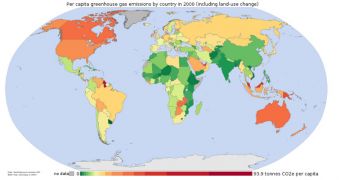According to a new analysis conducted by an international team of researchers, it would appear that companies experience a diminishing of their stock value that is directly proportional to the amount of greenhouse gases their operations are emitting.
Experts from the University of California in Davis (UCD), the University of California in Berkeley (UCB) and the University of Otago (UO), in New Zealand, were involved in this study.
The team learned that the influence the greenhouse gases (GHG) a company emits have on the stock value is significant, and definitely worthy of mention. If a company emits more carbon dioxide (CO2) than other similar companies, than its market stock is lower (once other factors are compensated for).
UCD Graduate School of Management professor Paul Griffin was the leader of the research team, which also determined that the market itself is capable of responding nearly immediately to announcements of companies disregarding the environment.
If word gets out that a corporation is not caring for the environment, and therefore contributes to global warming, then the market value of that company will drop nearly immediately. Oftentimes, the effects are felt the very same day the announcements are made.
“It really does appear to be a valuation factor. Greenhouse gas emissions are important to investors in assessing companies,” Griffin says, adding that the same effect was noticed even if companies themselves presented figures related to their own pollution levels.
“After controlling for normal valuation factors like assets and earnings, we found the value of stocks to be a function of greenhouse gas emissions,” Griffin and his team write on the Social Science Research Network, a grid containing social sciences research.
The correlation was found to be strongest for energy companies and utilities, say the investigators, who analyzed more than four years of data. The connections were compiled using advanced mathematical models, the group adds.
Investors “are examining the economic impact of what a company is doing on climate change, and they are assessing whether that is positive or negative for the company's value,” the team leader adds.
He explains that markets think into the future by default, and are therefore capable of anticipating a time when corporations that emit a lot of GHG, or otherwise disregard the environment, will need to pay fines and lawsuit costs to repay their debt.

 14 DAY TRIAL //
14 DAY TRIAL //